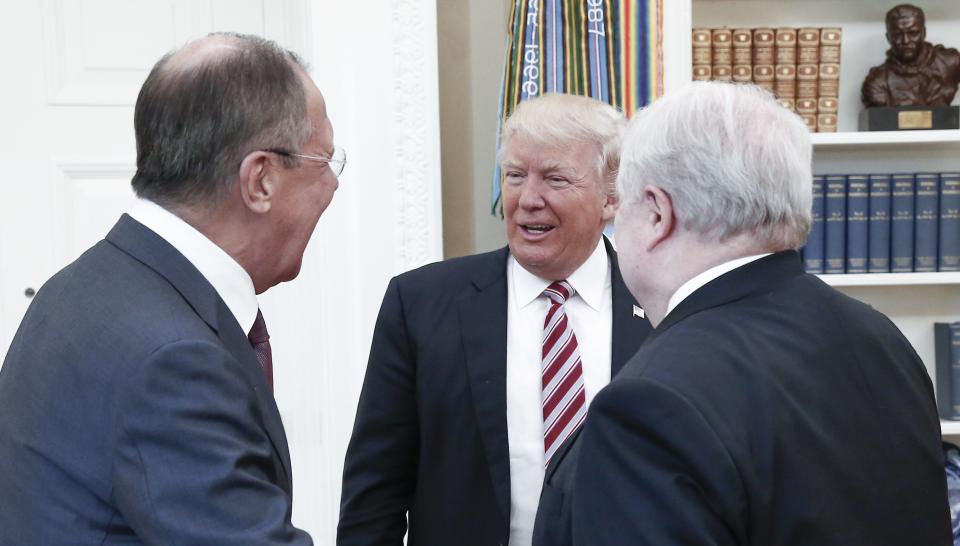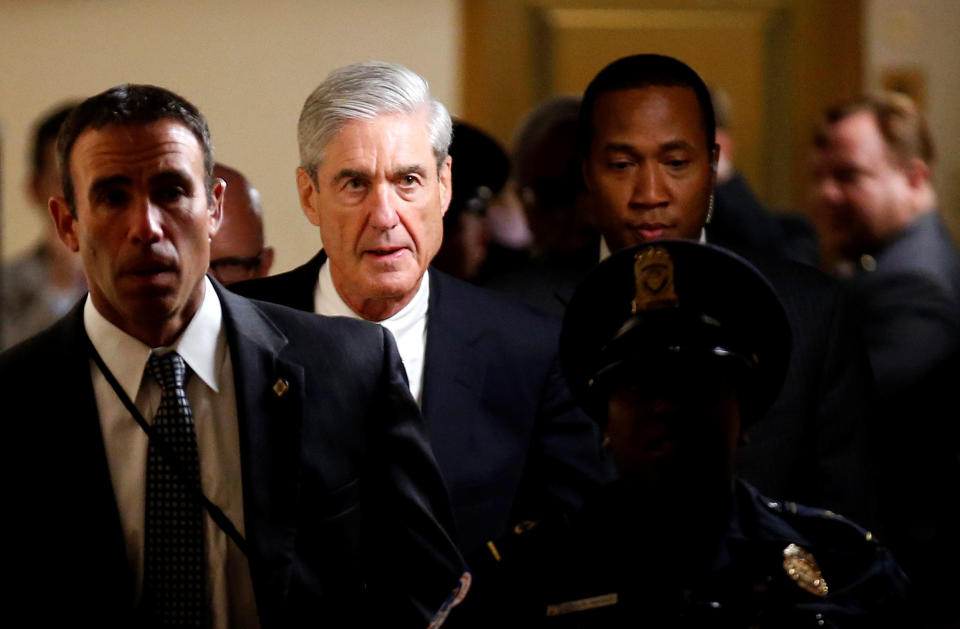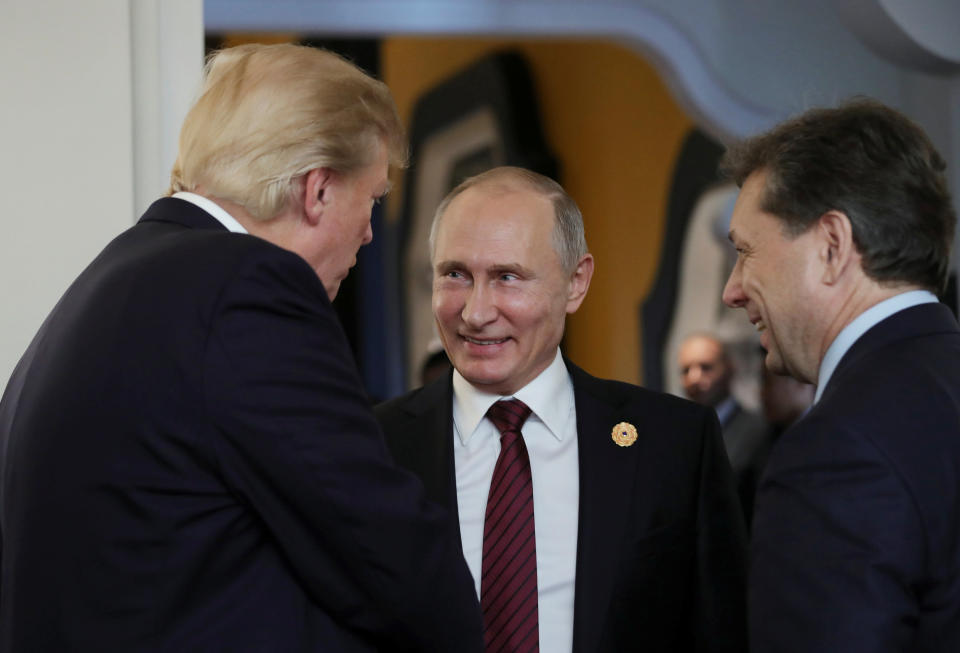Opinion: Is America's President A Russian Asset?

Until now, the notion of an American president controlled by a foreign adversary was confined to fiction.
In thrillers, no plot is too paranoid or absurd. Imagine this one: A hostile power ― for verisimilitude, Russia works best ― installs a compliant U.S. president by tampering with our election. When our traitorous leader begins menacing officials who suspect his perfidy, the Russians unleash a torrent of propaganda to support him, using front people to conceal their role. Soon, they have divided America into warring camps, buying their puppet time to cover up his actions while they continue to pull his strings. Desperate, a former director of national intelligence warns that Russia’s despotic leader ― a murderous former KGB agent ― is handling our president like a Russian “asset.”
America has stepped through the looking glass. The intelligence director is James Clapper. The Russian spymaster is Vladimir Putin. The American president is Donald Trump.
What underlies Trump’s hysteria about the investigation by special counsel Robert Mueller? One inescapable possibility is that he compromised America’s interests in exchange for Putin’s help in 2016.
This much we know: Russia hacked damaging emails from the Clinton campaign, which WikiLeaks released at critical moments. Concurrently, Russian bots and operatives within the U.S. targeted key states with fake news and political activities calculated to help Trump ― a massive assault for which Mueller has now indicted 13 Russians and three Russian companies.

For Trump’s part, he adamantly stonewalls sanctions punishing Russia for its intrusion. His campaign changed the GOP platform to soften resistance to Russian aggression in the Ukraine. And he has done nothing to combat further Russian manipulation in 2018 ― or even spent a dime of the $120 million allocated to the State Department for such purposes ― even though our intelligence agencies urgently warn that Russia means to repeat its onslaught of fake news and attacks on our electoral systems.
What explains Trump’s blatant dereliction of duty? The alternative to knowing complicity is rank stupidity ― and an astonishing susceptibility to manipulation. But if Trump is merely Putin’s gobsmacked fool, what is he so desperate to conceal?
Start with the repeated contacts between Trump’s campaign and Kremlin-connected Russians. Remarkably, Trump denies knowing anything about that. Yet the FBI warned him as early as August 2016 that Russia would try to infiltrate his campaign.
And it already had. In March 2016, a Russian intermediary told Trump campaign adviser George Papadopoulos that Russia had “thousands of emails” damaging to Trump’s rival Hillary Clinton. In June 2016, other Russians offered Donald Trump Jr., Trump son-in-law Jared Kushner and Trump campaign manager Paul Manafort information harmful to Clinton as part of their “government’s support for Mr. Trump.”
Instead of reporting these approaches to the FBI, Trump’s representatives welcomed them ― confirming for Russia that they were eager to collaborate. The ensuing 50-plus contacts included communication between Russian Ambassador Sergey Kislyak and Kushner, future national security adviser Michael Flynn, and future Attorney General Jeff Sessions. It defies belief that all these Trump relatives and key subordinates concealed this highly sensitive entwinement from the demanding and imperious Donald Trump.
Nor did it occur in a vacuum. On June 15, a Russian hacker posted documents stolen from the Democratic National Committee. On July 18, the Trump campaign inexplicably amended the GOP platform to remove support for arming Ukraine against Russian domination. On July 22, WikiLeaks published yet more emails damaging to Clinton.
By election day, WikiLeaks and two Russian-sponsored sites posted more than 150,000 emails ― some hours after Trump’s salacious comments in an old “Access Hollywood” tape became public. In October, U.S. intelligence agencies reported their “confident” conclusion that the Russian government had hacked the Clinton campaign and “that only Russia’s senior–most officials could have authorized these activities.” Yet Trump’s campaign continued to conceal ― and publicly deny ― contacts with Russia.
Concurrently, Russia targeted specific demographic groups with fake news calculated to depress the Clinton vote among women and minorities, while inflaming racial anxieties among whites partial to Trump. The sophistication behind this effort raises questions as to whether the Trump campaign pointed Russians toward selected precincts in pivotal states such as Pennsylvania, Michigan and Wisconsin.
Whatever the particulars, by multiple accounts, Putin considers his intrusion into our election an extraordinary success. Given Trump’s conduct as president, he should.

Before Trump’s inauguration, our intelligence agencies met with Trump to detail Russia’s attack on our election ― including, remarkably, Putin’s specific directions for the operation. Pressed by advisers to accept these findings, Trump asserted that the agencies could not be trusted, and proceeded on his pro-Russia course.
As president-elect, Trump could anticipate relieving Russia of sanctions for its aggressions in Ukraine ― which was allegedly a subject of the June meeting with Trump Jr. But in December, outgoing President Barack Obama imposed further sanctions for Russia’s electoral meddling.
In secret conversations, Kislyak and Flynn discussed lifting all sanctions ― thus undermining America’s efforts to protect itself. Here, collusion potentially morphs into a cover-up to which Trump is central.
Unbeknownst to Flynn, the FBI monitored his calls with Kislyak. Learning of this, The Washington Post asked Flynn whether the two had discussed sanctions relief. In the ensuing days, Flynn lied repeatedly ― to the press, to Trump’s vice president and chief of staff and, fatefully, to the FBI itself. The most logical explanation would be that Flynn was hiding a crucial fact: that Trump had authorized those conversations.
Warned by the Justice Department that his chief foreign policy adviser had lied to law enforcement, Trump himself began to lie. After the Post reported that Flynn had misled the FBI, Trump denied knowing about the Post story, concealing what he already knew. Only after the Post revealed the Justice Department’s warning to Trump ― given 18 days prior ― did Trump seek Flynn’s resignation, on the preposterous pretext that Flynn had lied to Vice President Mike Pence over three weeks before.
Thus commenced a year of presidential actions that seem designed to bury Trump’s efforts to give Putin what he most wanted ― sanctions relief ― and, quite possibly, to keep Flynn from exposing that this was part of a quid pro quo.
Beyond dispute is Trump’s frenzy to derail the Russia investigation. Having failed to persuade FBI director James Comey to protect Flynn, Trump fired him. To further insulate himself, he badgered Sessions not to recuse himself from overseeing the investigation. When that failed, resulting in the appointment of a special counsel, Trump had to be dissuaded from firing Mueller. Throughout, Trump assailed the law enforcement and intelligence agencies seeking to uncover the truth.
Love HuffPost? Become a founding member of HuffPost Plus today.
WITCH HUNT!
— Donald J. Trump (@realDonaldTrump) February 27, 2018
All this was swathed in lies ― among them a statement Trump crafted for Donald Trump Jr., claiming that his meeting with Russians concerned impediments to adoption. As late as August 2017, Trump proclaimed: “There’s nobody in the campaign that saw anybody from Russia.” Just this Wednesday, The New York Times reported that Trump had questioned two close aides about their interviews with Mueller’s team, and asked that one ― White House counsel Don McGahn ― issue a false statement denying that Trump had asked him to fire Mueller.
New revelations underscore the breadth of this deception. Trump associate Roger Stone ― who predicted an “October surprise” after contacts with Russian hackers ― also, we now learn, communicated directly with WikiLeaks. The downgrading of Kushner’s security clearance reflects concerns that his financial troubles were being exploited by foreign governments ― illuminating his late-2016 meeting with a shady Kremlin-connected banker.
Meanwhile, Mueller has negotiated guilty pleas and cooperation agreements with Trump associates on both sides of the prospective quid pro quo: Papadopoulos for the emails; Flynn for sanctions relief. Through a similar deal with Rick Gates, Manafort’s principal associate, Mueller is squeezing a man linked to the crucial June 2016 meeting with Russians, and with the alteration of the Republican platform regarding Ukraine. Above all, Manafort had the motive and connections to facilitate a conspiracy between Russia and the Trump campaign ― and Trump himself.
Mueller’s indictment of Gates and Manafort details a tawdry effort to launder money from Manafort’s work for Victor Yanukovych, a thuggish former Ukrainian president and client of Russia. Through this association, Manafort became linked with wealthy interests allied with the Kremlin.
But by 2016, Manafort was financially overextended. Desperate for fresh sources of credit, he approached Trump to offer his services as campaign manager ― free of charge. Once ensconced, he was ideally situated to seek new loans from Kremlin–connected sources, perhaps in exchange for brokering a mutually beneficial arrangement between the Trump campaign and Russia. Whatever the case, this would fit Manafort’s career as a high-stakes international influence peddler; Trump’s as an amoral and self-obsessed opportunist; and Putin’s as a blackmailer and recruiter of Russian assets.
No wonder Trump’s lawyers oppose allowing Mueller to interview their habitually mendacious client. Every question could expose whether Trump is Putin’s dupe ― or something infinitely worse. What does Trump know about meetings between Russians and members of his campaign ― including Flynn, Manafort, Kushner and Trump Jr. ― and when was he told about them? Did anyone inform him that Russia was offering to help him become president? Did Trump know Russia had Clinton’s emails before WikiLeaks released them? Was Manafort an intermediary between Trump and highly placed Russians? Why did Trump not fire Flynn after learning that he had lied to the FBI? Why did he fire Comey, and with whom did he discuss this? Why did he craft Trump Jr.’s false cover story? And so on, until Mueller reaches the biggest “why” of all.
Whatever the answer, Americans must know. Putin already does.
Richard North Patterson is a New York Times best-selling author of 22 novels, a former chairman of Common Cause, and a member of the Council on Foreign Relations.
ALSO ON HUFFPOST OPINION
Robert Mueller Has Trump Cornered
Are Black Americans Allowed In Wakanda?
Conservatives Who Are Horrified By Trump Let Themselves Off The Hook
This article originally appeared on HuffPost.
